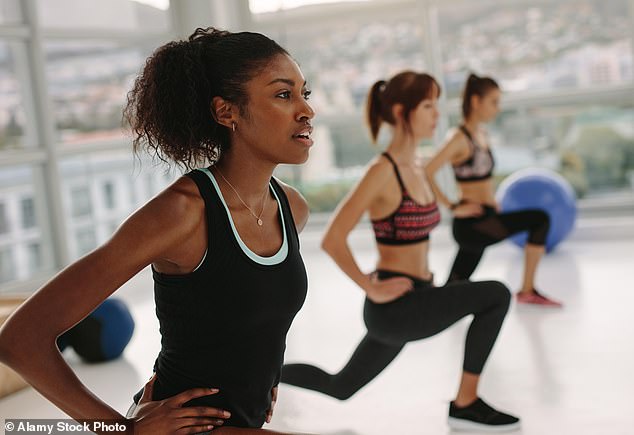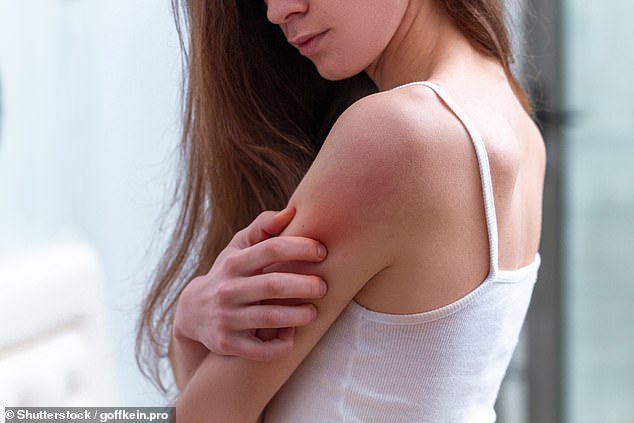Dermatologists are urging people not to skip the shower after they work out, over fears it could lead to painful skin infections.
Exercise is a key factor for long-term health and longevity, especially when it’s brisk enough to work up a sweat, but showering afterwards is key to removing sweat, dirt, and oils before they can clog pores and cause a breakout or dermatitis, a condition in which skin becomes inflamed and itchy.
It can also prevent skin irritation and folliculitis, when hair follicles become infected and inflamed, as well as an infection brought on by a buildup of sweat, bacteria, and oil, compounded with heat. Those substances mix together and get stuck inside a pore.
When a pore is clogged, the body’s immune system sees it as a threat and sends blood to the area to fight it, causing swelling and redness.
And the benefits of a shower go beyond maintaining good personal hygiene. Showering in cold water aids in muscle recovery and soreness, while a hot shower can increase blood flow, potentially helping to flush out metabolic waste products from muscles.
But a quick dip under a showerhead is not enough to slough off the potentially harmful bacteria.
Dermatologists advise washing with a nourishing, pH-balanced body wash. For people with acne-prone skin, they say to look for formulas that contain salicylic acid, glycolic acid, or niacinamide.

Showering soon after a sweaty workout is crucial for washing away pore-clogging residue and preventing breakouts (stock image)
While it is difficult to pin down the number of people who share the bad habit of skipping a shower after exercise, a survey in the UK conducted in 2020, at the height of the pandemic, reported that of the 93 percent of Brits who work out at home, 73 percent put off showering for as long as they can.
According to North Carolina-based dermatologist Dr Knox Beasley, who spoke to Yahoo! Health, people should shower within a half hour of ending their workout.
Sweat itself is odorless, but when it sits on the skin, it feeds bacteria that cause body odor.
The effect is worse for people with body hair or beards, which trap sweat and create a perfect environment for bacteria to thrive, Dr Beasley said.
And acne is likely to break out on the neck, back, chest, and shoulders, where a person may be less likely to scrub clean.
Dr Beasley explained that the longer sweat stays on the skin, the more it damages its natural protection. The bad habit of skipping a shower allows bacteria to multiply and worsen the issue.
Dr Anna Chacon of Miami, meanwhile, said the buildup of sweat, bacteria, and oil can also lead to redness and skin irritation.
These contaminants become trapped in the pores when combined with heat, leading to irritation flare-ups, particularly in people with sensitive skin or preexisting skin conditions like eczema or psoriasis.

Neglecting to shower can cause inflamed hair follicles, itchy, scaly skin or more severe skin infections (stock image)
These effects also include folliculitis, a condition in which hair follicles become inflamed and the skin breaks out in small pimple-like bumps called dermatitis. This causes itchy, scaly skin, or, in more severe cases, a skin infection, according to New York-based dermatologist Dr Jeremy Brauer.
Putting off a shower and leaving feet sweaty and unwashed invites athlete’s foot, a fungal infection that causes itchy, scaly, cracked skin between the toes and on the feet.
Like athlete’s foot, jock itch is a fungal infection that affects the groin area. Tight, sweaty workout clothes create the warm, moist conditions that the fungus needs to grow, causing a red, itchy, often ring-shaped rash.
Ringworm is another fungal infection and it can appear anywhere on the body, presenting as a circular, red, scaly rash that may itch.
It is highly contagious and can be spread through contact with contaminated surfaces, such as gym mats or equipment, or from another part of one’s own body.
The most serious threat from not showering is infection by Staph or its drug-resistant form, MRSA. Friction and sweat create micro-tears in the skin, allowing these common bacteria to enter.
The infection can quickly escalate from a minor red bump to a severe abscess requiring surgical drainage. The risk is highest in gym environments, where bacteria thrive on shared equipment.
For dry or sensitive skin, Dr Brauer suggests using hypoallergenic products and avoiding heavy fragrances.
Those prone to acne should choose formulas with acne-fighting chemicals, including salicylic acid, glycolic acid or niacinamide.
While Dr Beasley finds that weekly exfoliation is good for preventing buildup, he advised against doing it after a workout when the skin is more sensitive.
For situations where a post-workout shower within 30 minutes is not possible, Dr Beasley recommended at least using cleansing wipes as a stopgap, though he cautioned that wipes are no replacement for a shower.












